GA31: Analyzing Ethical Issues in Research Methods & Solutions
VerifiedAdded on 2023/04/22
|7
|1619
|97
Essay
AI Summary
This essay delves into the ethical issues surrounding research, particularly in light of Dr. He Jiankui's controversial embryo editing. It defines research ethics as a set of guidelines ensuring responsible conduct, preventing data manipulation, and safeguarding participants. The essay identifies five key ethical challenges: informed consent, beneficence and non-maleficence, respect for confidentiality and autonomy, vulnerable populations, and privacy. It critiques Dr. Jiankui's work for lacking informed consent, university approval, and peer review, and for using vulnerable subjects. The essay proposes solutions such as obtaining truthful consent, ensuring confidentiality, and minimizing harm. It concludes by emphasizing the importance of ethical norms in research to promote truth, prevent misconduct, and protect human subjects, advocating for proactive measures to avoid ethical breaches in future research endeavors.
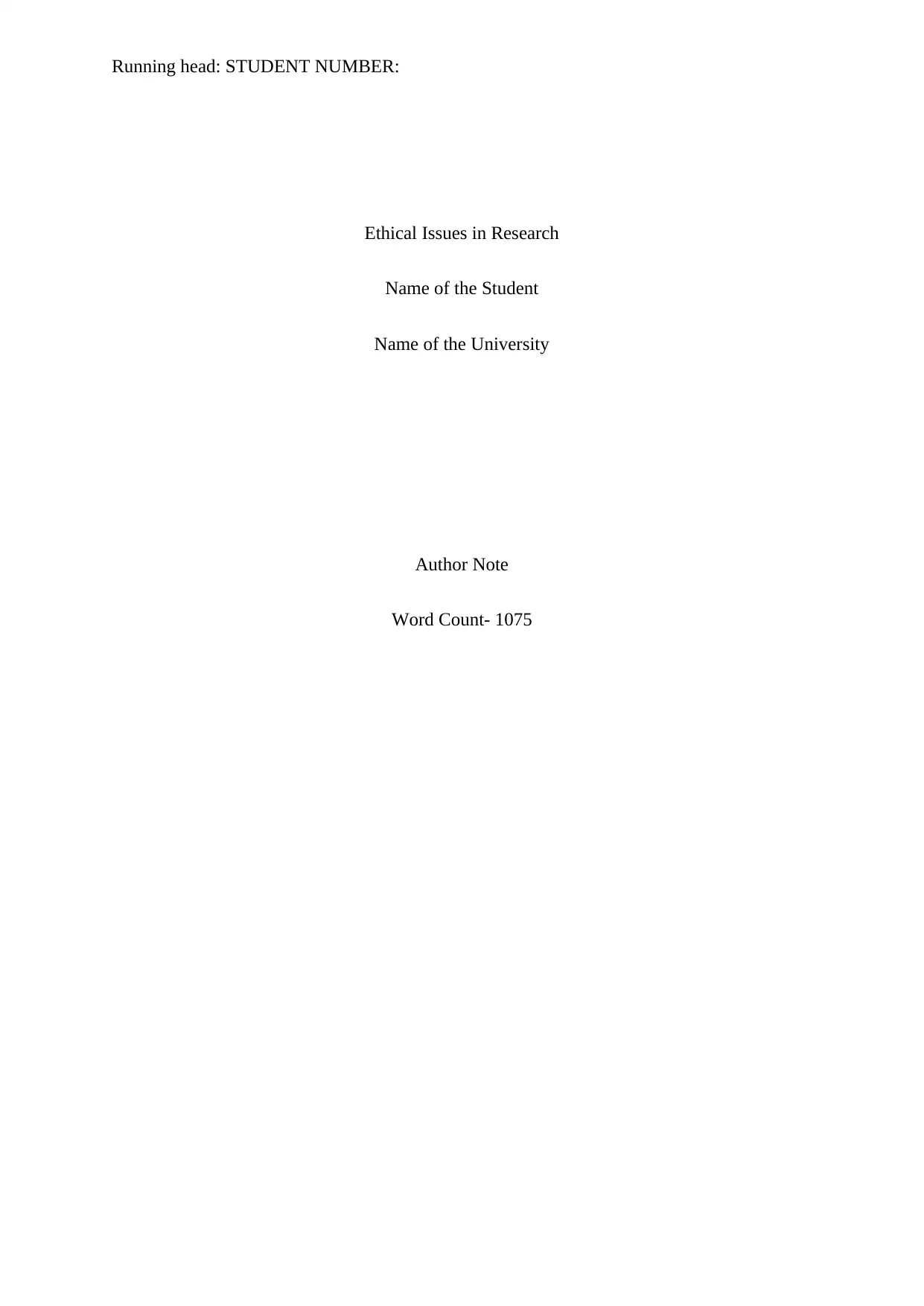
Running head: STUDENT NUMBER:
Ethical Issues in Research
Name of the Student
Name of the University
Author Note
Word Count- 1075
Ethical Issues in Research
Name of the Student
Name of the University
Author Note
Word Count- 1075
Paraphrase This Document
Need a fresh take? Get an instant paraphrase of this document with our AI Paraphraser
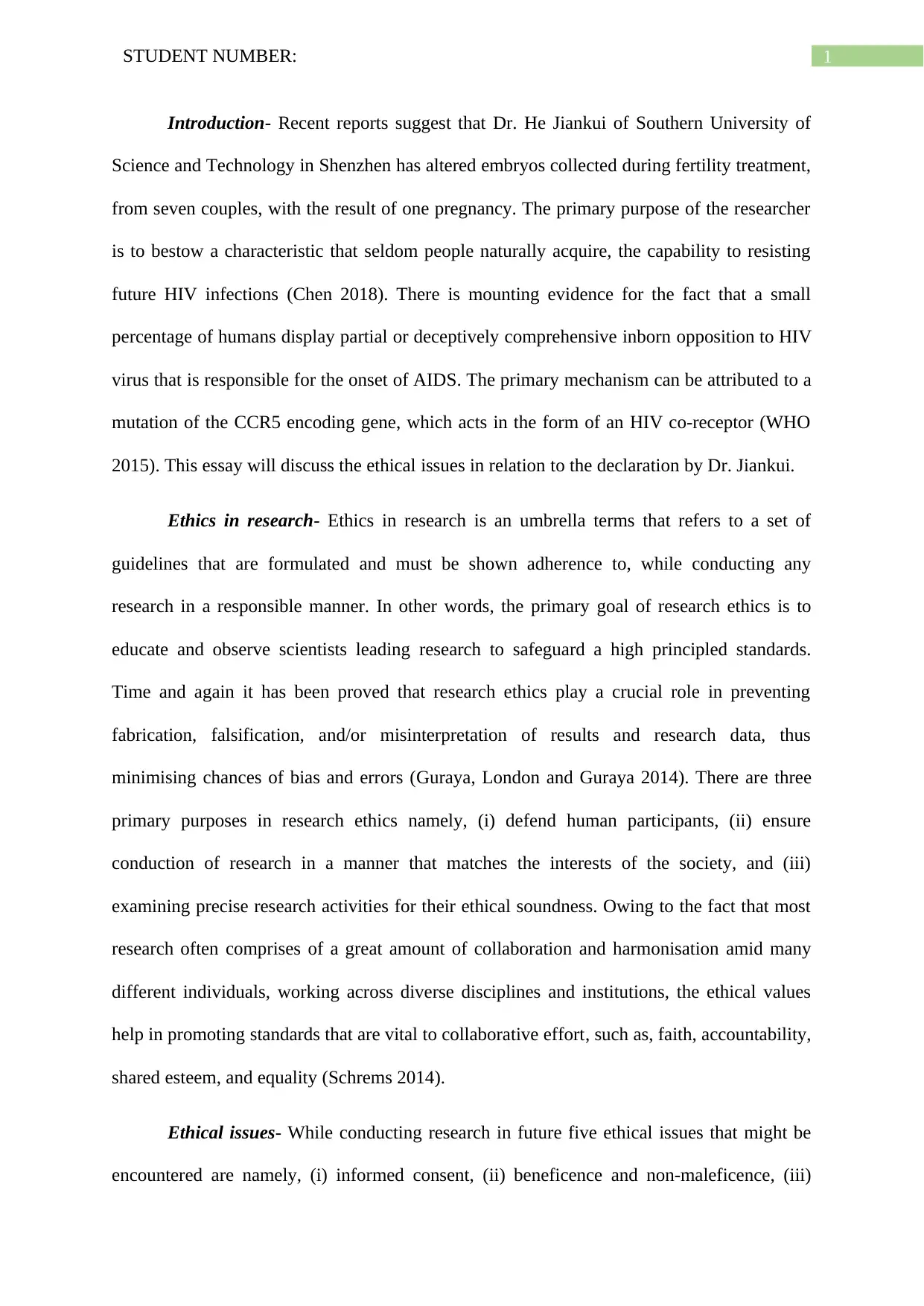
1STUDENT NUMBER:
Introduction- Recent reports suggest that Dr. He Jiankui of Southern University of
Science and Technology in Shenzhen has altered embryos collected during fertility treatment,
from seven couples, with the result of one pregnancy. The primary purpose of the researcher
is to bestow a characteristic that seldom people naturally acquire, the capability to resisting
future HIV infections (Chen 2018). There is mounting evidence for the fact that a small
percentage of humans display partial or deceptively comprehensive inborn opposition to HIV
virus that is responsible for the onset of AIDS. The primary mechanism can be attributed to a
mutation of the CCR5 encoding gene, which acts in the form of an HIV co-receptor (WHO
2015). This essay will discuss the ethical issues in relation to the declaration by Dr. Jiankui.
Ethics in research- Ethics in research is an umbrella terms that refers to a set of
guidelines that are formulated and must be shown adherence to, while conducting any
research in a responsible manner. In other words, the primary goal of research ethics is to
educate and observe scientists leading research to safeguard a high principled standards.
Time and again it has been proved that research ethics play a crucial role in preventing
fabrication, falsification, and/or misinterpretation of results and research data, thus
minimising chances of bias and errors (Guraya, London and Guraya 2014). There are three
primary purposes in research ethics namely, (i) defend human participants, (ii) ensure
conduction of research in a manner that matches the interests of the society, and (iii)
examining precise research activities for their ethical soundness. Owing to the fact that most
research often comprises of a great amount of collaboration and harmonisation amid many
different individuals, working across diverse disciplines and institutions, the ethical values
help in promoting standards that are vital to collaborative effort, such as, faith, accountability,
shared esteem, and equality (Schrems 2014).
Ethical issues- While conducting research in future five ethical issues that might be
encountered are namely, (i) informed consent, (ii) beneficence and non-maleficence, (iii)
Introduction- Recent reports suggest that Dr. He Jiankui of Southern University of
Science and Technology in Shenzhen has altered embryos collected during fertility treatment,
from seven couples, with the result of one pregnancy. The primary purpose of the researcher
is to bestow a characteristic that seldom people naturally acquire, the capability to resisting
future HIV infections (Chen 2018). There is mounting evidence for the fact that a small
percentage of humans display partial or deceptively comprehensive inborn opposition to HIV
virus that is responsible for the onset of AIDS. The primary mechanism can be attributed to a
mutation of the CCR5 encoding gene, which acts in the form of an HIV co-receptor (WHO
2015). This essay will discuss the ethical issues in relation to the declaration by Dr. Jiankui.
Ethics in research- Ethics in research is an umbrella terms that refers to a set of
guidelines that are formulated and must be shown adherence to, while conducting any
research in a responsible manner. In other words, the primary goal of research ethics is to
educate and observe scientists leading research to safeguard a high principled standards.
Time and again it has been proved that research ethics play a crucial role in preventing
fabrication, falsification, and/or misinterpretation of results and research data, thus
minimising chances of bias and errors (Guraya, London and Guraya 2014). There are three
primary purposes in research ethics namely, (i) defend human participants, (ii) ensure
conduction of research in a manner that matches the interests of the society, and (iii)
examining precise research activities for their ethical soundness. Owing to the fact that most
research often comprises of a great amount of collaboration and harmonisation amid many
different individuals, working across diverse disciplines and institutions, the ethical values
help in promoting standards that are vital to collaborative effort, such as, faith, accountability,
shared esteem, and equality (Schrems 2014).
Ethical issues- While conducting research in future five ethical issues that might be
encountered are namely, (i) informed consent, (ii) beneficence and non-maleficence, (iii)
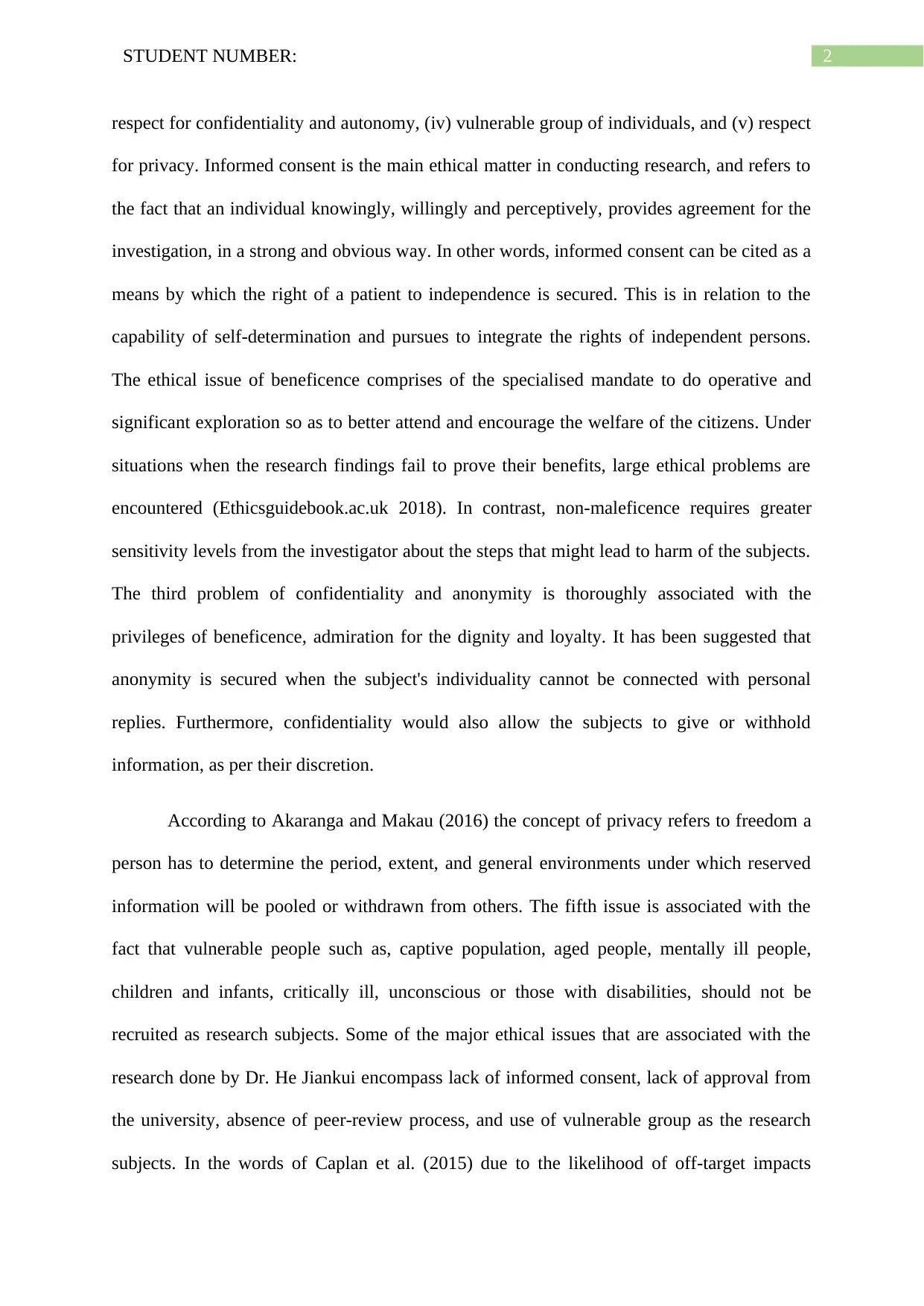
2STUDENT NUMBER:
respect for confidentiality and autonomy, (iv) vulnerable group of individuals, and (v) respect
for privacy. Informed consent is the main ethical matter in conducting research, and refers to
the fact that an individual knowingly, willingly and perceptively, provides agreement for the
investigation, in a strong and obvious way. In other words, informed consent can be cited as a
means by which the right of a patient to independence is secured. This is in relation to the
capability of self-determination and pursues to integrate the rights of independent persons.
The ethical issue of beneficence comprises of the specialised mandate to do operative and
significant exploration so as to better attend and encourage the welfare of the citizens. Under
situations when the research findings fail to prove their benefits, large ethical problems are
encountered (Ethicsguidebook.ac.uk 2018). In contrast, non-maleficence requires greater
sensitivity levels from the investigator about the steps that might lead to harm of the subjects.
The third problem of confidentiality and anonymity is thoroughly associated with the
privileges of beneficence, admiration for the dignity and loyalty. It has been suggested that
anonymity is secured when the subject's individuality cannot be connected with personal
replies. Furthermore, confidentiality would also allow the subjects to give or withhold
information, as per their discretion.
According to Akaranga and Makau (2016) the concept of privacy refers to freedom a
person has to determine the period, extent, and general environments under which reserved
information will be pooled or withdrawn from others. The fifth issue is associated with the
fact that vulnerable people such as, captive population, aged people, mentally ill people,
children and infants, critically ill, unconscious or those with disabilities, should not be
recruited as research subjects. Some of the major ethical issues that are associated with the
research done by Dr. He Jiankui encompass lack of informed consent, lack of approval from
the university, absence of peer-review process, and use of vulnerable group as the research
subjects. In the words of Caplan et al. (2015) due to the likelihood of off-target impacts
respect for confidentiality and autonomy, (iv) vulnerable group of individuals, and (v) respect
for privacy. Informed consent is the main ethical matter in conducting research, and refers to
the fact that an individual knowingly, willingly and perceptively, provides agreement for the
investigation, in a strong and obvious way. In other words, informed consent can be cited as a
means by which the right of a patient to independence is secured. This is in relation to the
capability of self-determination and pursues to integrate the rights of independent persons.
The ethical issue of beneficence comprises of the specialised mandate to do operative and
significant exploration so as to better attend and encourage the welfare of the citizens. Under
situations when the research findings fail to prove their benefits, large ethical problems are
encountered (Ethicsguidebook.ac.uk 2018). In contrast, non-maleficence requires greater
sensitivity levels from the investigator about the steps that might lead to harm of the subjects.
The third problem of confidentiality and anonymity is thoroughly associated with the
privileges of beneficence, admiration for the dignity and loyalty. It has been suggested that
anonymity is secured when the subject's individuality cannot be connected with personal
replies. Furthermore, confidentiality would also allow the subjects to give or withhold
information, as per their discretion.
According to Akaranga and Makau (2016) the concept of privacy refers to freedom a
person has to determine the period, extent, and general environments under which reserved
information will be pooled or withdrawn from others. The fifth issue is associated with the
fact that vulnerable people such as, captive population, aged people, mentally ill people,
children and infants, critically ill, unconscious or those with disabilities, should not be
recruited as research subjects. Some of the major ethical issues that are associated with the
research done by Dr. He Jiankui encompass lack of informed consent, lack of approval from
the university, absence of peer-review process, and use of vulnerable group as the research
subjects. In the words of Caplan et al. (2015) due to the likelihood of off-target impacts
⊘ This is a preview!⊘
Do you want full access?
Subscribe today to unlock all pages.

Trusted by 1+ million students worldwide
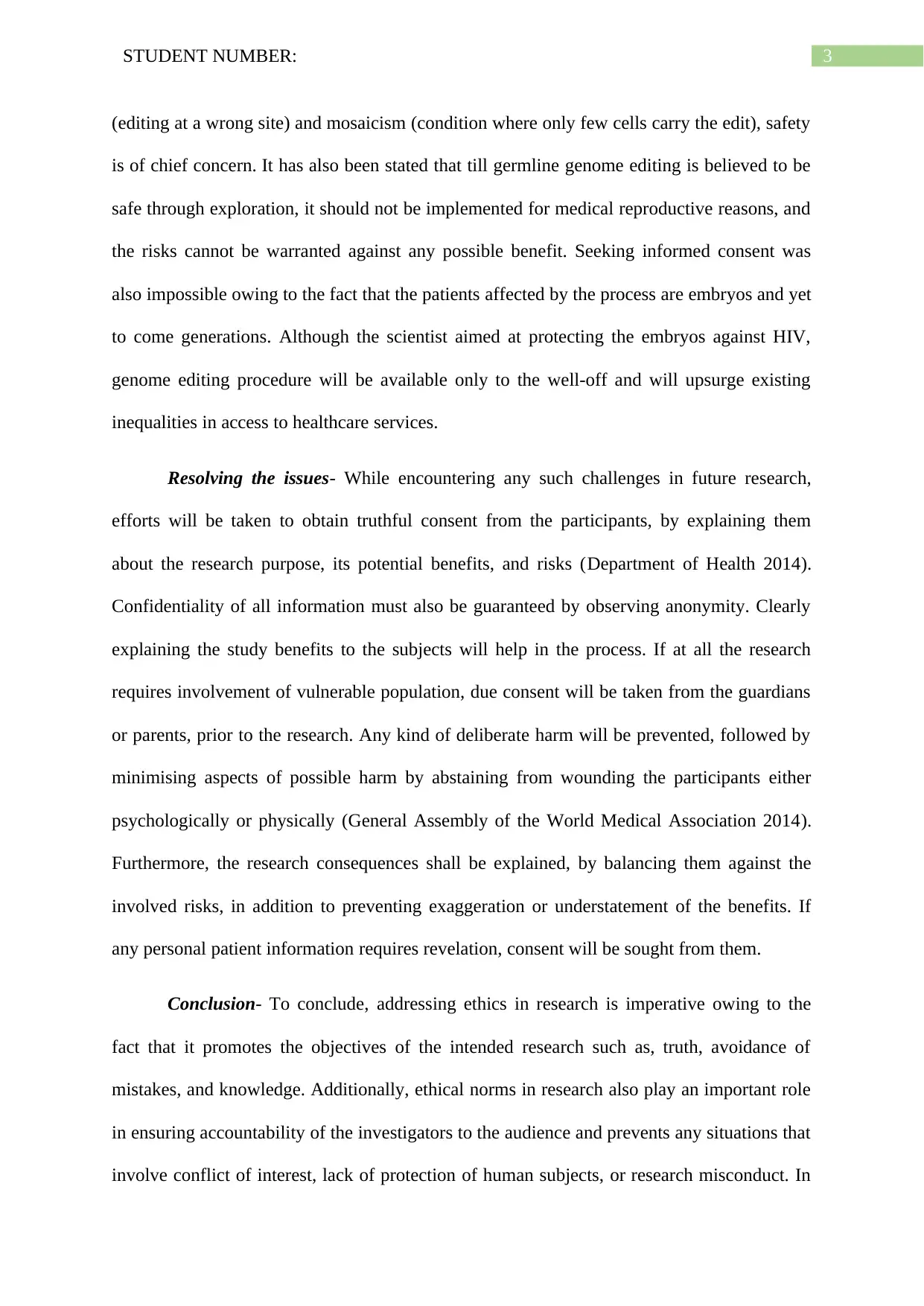
3STUDENT NUMBER:
(editing at a wrong site) and mosaicism (condition where only few cells carry the edit), safety
is of chief concern. It has also been stated that till germline genome editing is believed to be
safe through exploration, it should not be implemented for medical reproductive reasons, and
the risks cannot be warranted against any possible benefit. Seeking informed consent was
also impossible owing to the fact that the patients affected by the process are embryos and yet
to come generations. Although the scientist aimed at protecting the embryos against HIV,
genome editing procedure will be available only to the well-off and will upsurge existing
inequalities in access to healthcare services.
Resolving the issues- While encountering any such challenges in future research,
efforts will be taken to obtain truthful consent from the participants, by explaining them
about the research purpose, its potential benefits, and risks (Department of Health 2014).
Confidentiality of all information must also be guaranteed by observing anonymity. Clearly
explaining the study benefits to the subjects will help in the process. If at all the research
requires involvement of vulnerable population, due consent will be taken from the guardians
or parents, prior to the research. Any kind of deliberate harm will be prevented, followed by
minimising aspects of possible harm by abstaining from wounding the participants either
psychologically or physically (General Assembly of the World Medical Association 2014).
Furthermore, the research consequences shall be explained, by balancing them against the
involved risks, in addition to preventing exaggeration or understatement of the benefits. If
any personal patient information requires revelation, consent will be sought from them.
Conclusion- To conclude, addressing ethics in research is imperative owing to the
fact that it promotes the objectives of the intended research such as, truth, avoidance of
mistakes, and knowledge. Additionally, ethical norms in research also play an important role
in ensuring accountability of the investigators to the audience and prevents any situations that
involve conflict of interest, lack of protection of human subjects, or research misconduct. In
(editing at a wrong site) and mosaicism (condition where only few cells carry the edit), safety
is of chief concern. It has also been stated that till germline genome editing is believed to be
safe through exploration, it should not be implemented for medical reproductive reasons, and
the risks cannot be warranted against any possible benefit. Seeking informed consent was
also impossible owing to the fact that the patients affected by the process are embryos and yet
to come generations. Although the scientist aimed at protecting the embryos against HIV,
genome editing procedure will be available only to the well-off and will upsurge existing
inequalities in access to healthcare services.
Resolving the issues- While encountering any such challenges in future research,
efforts will be taken to obtain truthful consent from the participants, by explaining them
about the research purpose, its potential benefits, and risks (Department of Health 2014).
Confidentiality of all information must also be guaranteed by observing anonymity. Clearly
explaining the study benefits to the subjects will help in the process. If at all the research
requires involvement of vulnerable population, due consent will be taken from the guardians
or parents, prior to the research. Any kind of deliberate harm will be prevented, followed by
minimising aspects of possible harm by abstaining from wounding the participants either
psychologically or physically (General Assembly of the World Medical Association 2014).
Furthermore, the research consequences shall be explained, by balancing them against the
involved risks, in addition to preventing exaggeration or understatement of the benefits. If
any personal patient information requires revelation, consent will be sought from them.
Conclusion- To conclude, addressing ethics in research is imperative owing to the
fact that it promotes the objectives of the intended research such as, truth, avoidance of
mistakes, and knowledge. Additionally, ethical norms in research also play an important role
in ensuring accountability of the investigators to the audience and prevents any situations that
involve conflict of interest, lack of protection of human subjects, or research misconduct. In
Paraphrase This Document
Need a fresh take? Get an instant paraphrase of this document with our AI Paraphraser
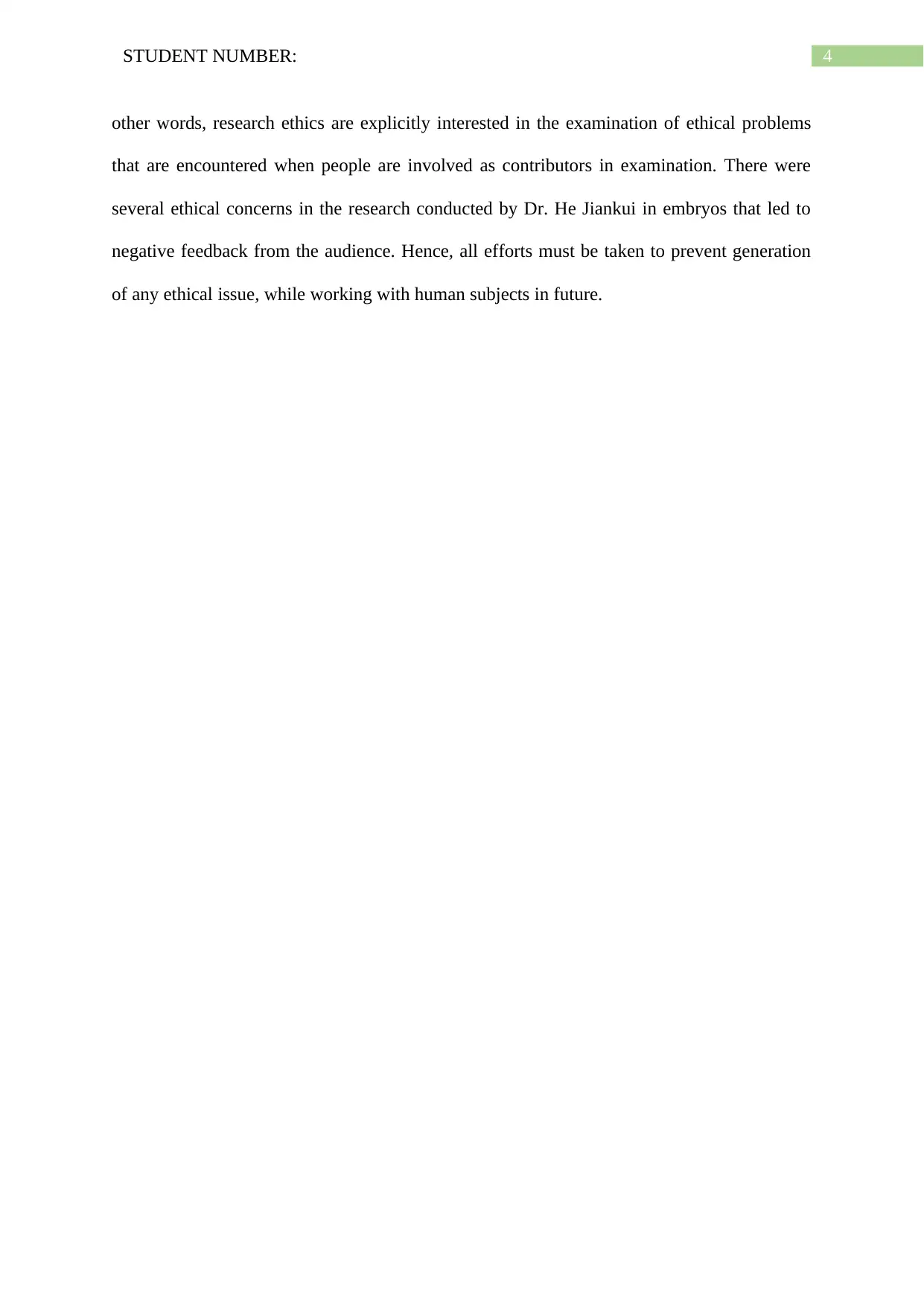
4STUDENT NUMBER:
other words, research ethics are explicitly interested in the examination of ethical problems
that are encountered when people are involved as contributors in examination. There were
several ethical concerns in the research conducted by Dr. He Jiankui in embryos that led to
negative feedback from the audience. Hence, all efforts must be taken to prevent generation
of any ethical issue, while working with human subjects in future.
other words, research ethics are explicitly interested in the examination of ethical problems
that are encountered when people are involved as contributors in examination. There were
several ethical concerns in the research conducted by Dr. He Jiankui in embryos that led to
negative feedback from the audience. Hence, all efforts must be taken to prevent generation
of any ethical issue, while working with human subjects in future.
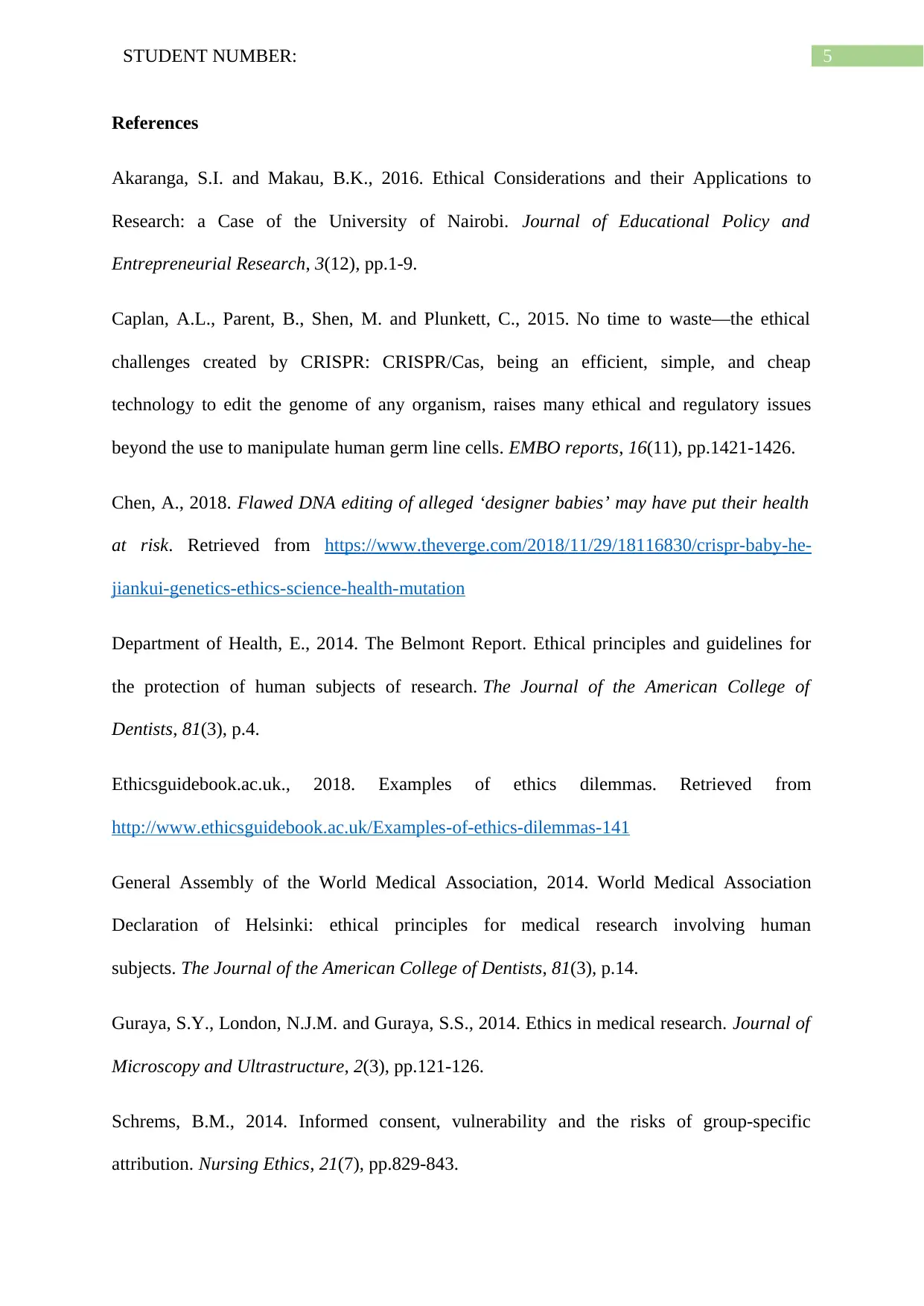
5STUDENT NUMBER:
References
Akaranga, S.I. and Makau, B.K., 2016. Ethical Considerations and their Applications to
Research: a Case of the University of Nairobi. Journal of Educational Policy and
Entrepreneurial Research, 3(12), pp.1-9.
Caplan, A.L., Parent, B., Shen, M. and Plunkett, C., 2015. No time to waste—the ethical
challenges created by CRISPR: CRISPR/Cas, being an efficient, simple, and cheap
technology to edit the genome of any organism, raises many ethical and regulatory issues
beyond the use to manipulate human germ line cells. EMBO reports, 16(11), pp.1421-1426.
Chen, A., 2018. Flawed DNA editing of alleged ‘designer babies’ may have put their health
at risk. Retrieved from https://www.theverge.com/2018/11/29/18116830/crispr-baby-he-
jiankui-genetics-ethics-science-health-mutation
Department of Health, E., 2014. The Belmont Report. Ethical principles and guidelines for
the protection of human subjects of research. The Journal of the American College of
Dentists, 81(3), p.4.
Ethicsguidebook.ac.uk., 2018. Examples of ethics dilemmas. Retrieved from
http://www.ethicsguidebook.ac.uk/Examples-of-ethics-dilemmas-141
General Assembly of the World Medical Association, 2014. World Medical Association
Declaration of Helsinki: ethical principles for medical research involving human
subjects. The Journal of the American College of Dentists, 81(3), p.14.
Guraya, S.Y., London, N.J.M. and Guraya, S.S., 2014. Ethics in medical research. Journal of
Microscopy and Ultrastructure, 2(3), pp.121-126.
Schrems, B.M., 2014. Informed consent, vulnerability and the risks of group-specific
attribution. Nursing Ethics, 21(7), pp.829-843.
References
Akaranga, S.I. and Makau, B.K., 2016. Ethical Considerations and their Applications to
Research: a Case of the University of Nairobi. Journal of Educational Policy and
Entrepreneurial Research, 3(12), pp.1-9.
Caplan, A.L., Parent, B., Shen, M. and Plunkett, C., 2015. No time to waste—the ethical
challenges created by CRISPR: CRISPR/Cas, being an efficient, simple, and cheap
technology to edit the genome of any organism, raises many ethical and regulatory issues
beyond the use to manipulate human germ line cells. EMBO reports, 16(11), pp.1421-1426.
Chen, A., 2018. Flawed DNA editing of alleged ‘designer babies’ may have put their health
at risk. Retrieved from https://www.theverge.com/2018/11/29/18116830/crispr-baby-he-
jiankui-genetics-ethics-science-health-mutation
Department of Health, E., 2014. The Belmont Report. Ethical principles and guidelines for
the protection of human subjects of research. The Journal of the American College of
Dentists, 81(3), p.4.
Ethicsguidebook.ac.uk., 2018. Examples of ethics dilemmas. Retrieved from
http://www.ethicsguidebook.ac.uk/Examples-of-ethics-dilemmas-141
General Assembly of the World Medical Association, 2014. World Medical Association
Declaration of Helsinki: ethical principles for medical research involving human
subjects. The Journal of the American College of Dentists, 81(3), p.14.
Guraya, S.Y., London, N.J.M. and Guraya, S.S., 2014. Ethics in medical research. Journal of
Microscopy and Ultrastructure, 2(3), pp.121-126.
Schrems, B.M., 2014. Informed consent, vulnerability and the risks of group-specific
attribution. Nursing Ethics, 21(7), pp.829-843.
⊘ This is a preview!⊘
Do you want full access?
Subscribe today to unlock all pages.

Trusted by 1+ million students worldwide
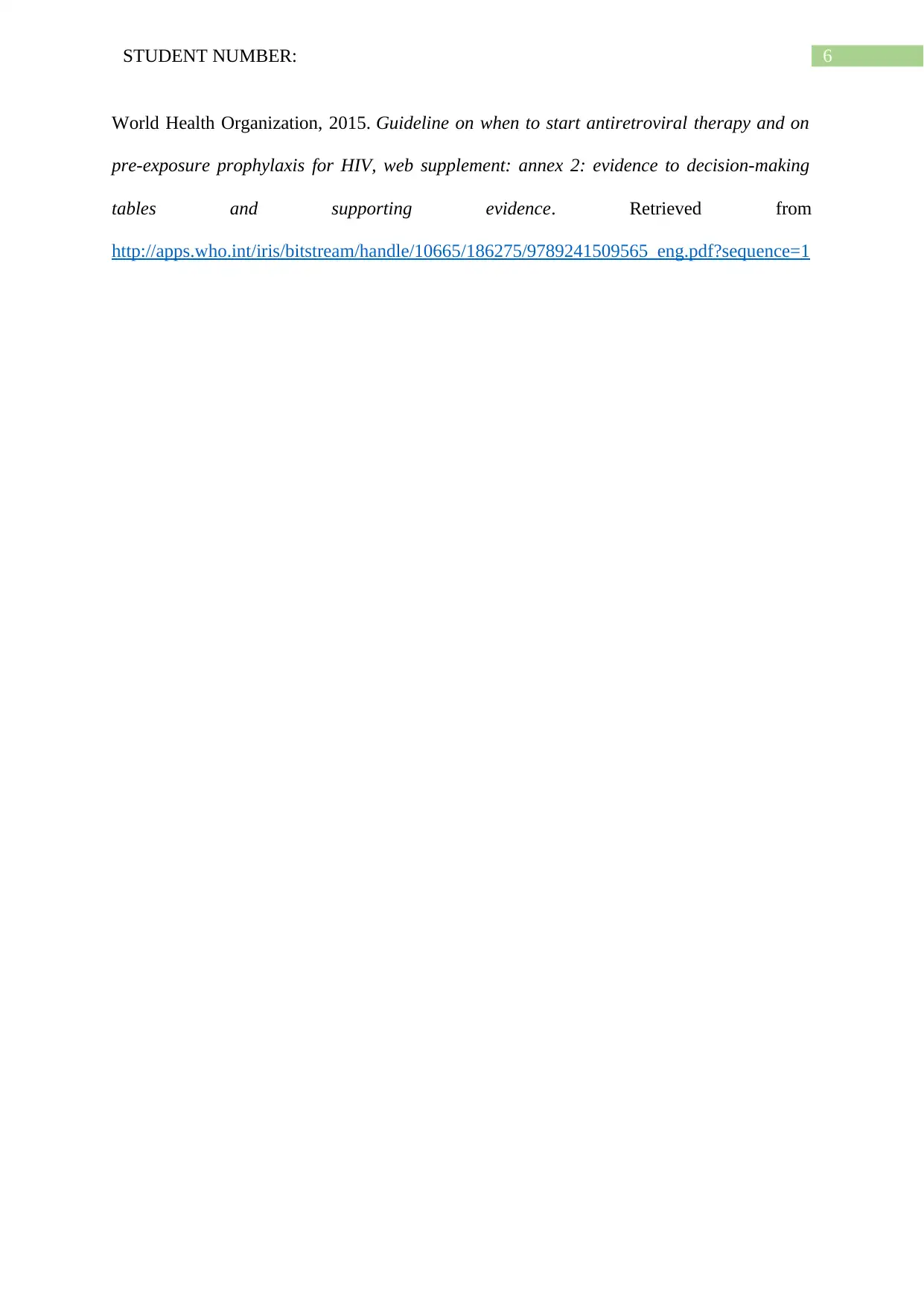
6STUDENT NUMBER:
World Health Organization, 2015. Guideline on when to start antiretroviral therapy and on
pre-exposure prophylaxis for HIV, web supplement: annex 2: evidence to decision-making
tables and supporting evidence. Retrieved from
http://apps.who.int/iris/bitstream/handle/10665/186275/9789241509565_eng.pdf?sequence=1
World Health Organization, 2015. Guideline on when to start antiretroviral therapy and on
pre-exposure prophylaxis for HIV, web supplement: annex 2: evidence to decision-making
tables and supporting evidence. Retrieved from
http://apps.who.int/iris/bitstream/handle/10665/186275/9789241509565_eng.pdf?sequence=1
1 out of 7
Related Documents
Your All-in-One AI-Powered Toolkit for Academic Success.
+13062052269
info@desklib.com
Available 24*7 on WhatsApp / Email
![[object Object]](/_next/static/media/star-bottom.7253800d.svg)
Unlock your academic potential
Copyright © 2020–2026 A2Z Services. All Rights Reserved. Developed and managed by ZUCOL.





